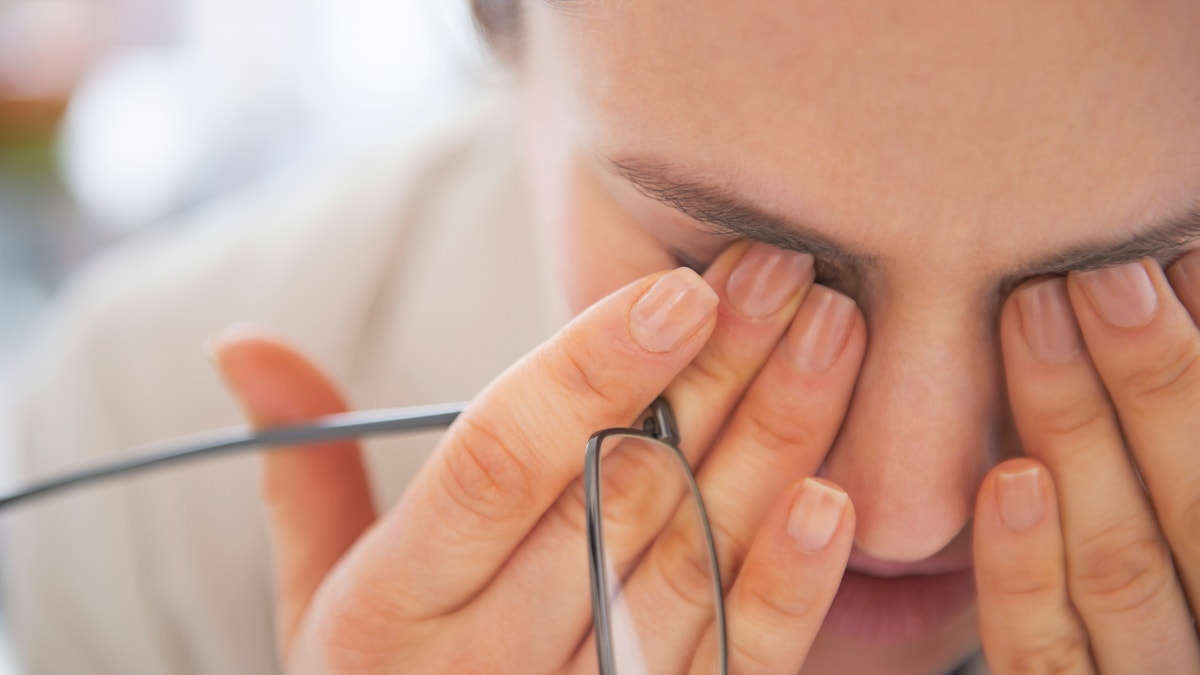
Closeup on tired business woman with eyeglasses (iStock)
As the plane touched down in Sydney my stomach churned and my head hurt. Facing reality was going to be tough. I was severely hung over. But not in the alcoholic sense.
My two-month round the world trip had gone all too fast. There’d been parties, tours, culture and drinking. There’d been nights I will always remember and nights I simply just can’t.
TECH ADDICTION MAY BE A BIGGER ISSUE FOR THIS SEX
The escape from reality was liberating and I loved that I could be whoever I wanted to be. But now that time was over.
Over the next few weeks I felt a melancholy and tiredness that wouldn’t shift. It wasn’t simply a case of the holiday blues or a shock at the return to reality. It was more than that. I was suffering an emotional hangover.
Unlike a traditional hangover, emotional hangovers don’t come with the banging headache and the need to eat hot chips. They’re also not driven by alcohol.
Instead, emotional hangovers are more likely to be caused by life events such as work incidences, a life disappointment, a friendship issue or even a simple argument.
TO SOLVE YOUR SLEEP PROBLEMS, TAKE THIS STEP FIRST
But emotional hangovers are not just caused by negative events. They can also follow holidays, weddings or honeymoons.
According to a recent study by a team at New York University, emotional experiences can induce physiological and internal brain states that persist for long periods of time after the emotional events have ended.
The study, which appears in the journal Nature Neuroscience, split subjects into two groups. The first group viewed pictures containing emotional content, followed by pictures of non-emotional scenes 10-30 minutes later.
The second group viewed the picture sets in the reverse order.
WHAT'S REALLY GOING ON INSIDE THE TEEN BRAIN
Both groups were monitored for both physiological arousal and brain activity during the screenings, and six hours later undertook a memory test related to the images viewed.
The results found that the first group was better able to recall the neutral images they saw last, compared to the second group who saw them first.
Such findings reveal that emotional experiences are more ingrained in our brains if they’re not subsequently followed by a non-emotional experience.
Dr Joann Lukins is a psychologist. She says that it should come as no surprise that, when an experience has impacted us, we might continue to re-experience it at some level through our thoughts and our feelings.
“Our previous experiences can be a ‘lens’ with which we view our current experience and future events,” she says.
STAYING FRIENDS WITH AN EX IS A TERRIBLE IDEA — HERE'S WHY
“Therefore, how we have experienced previous events is likely to be an influencer as to how we might experience the present day and the future.”
Dr Lukins says that any experience that elicits emotion in us, either good or bad, has the ability to result in an emotional hangover.
The key consideration is how important the event is to us, how pervasive the event is and how permanent the event is. It also relates to whether we personalise an event or whether it’s more externalised and influenced by others.
“It’s our interpretation of the event that’s key, and that’s what generates the emotional consequences,” says Dr Lukins. “Because of this, the occurrence of such hangovers is individually determined.”
YES, FACEBOOK MAY BE MAKING YOU LONELY
So should we be avoiding them?
“I’m not sure we need to try to avoid them. While they can be unpleasant, experiencing of emotions is part of living life and certainly those feelings are highlighting something that’s important,” she says.
“The adaptive nature of emotions is that they offer feedback. They allow you to understand your circumstances better, and enable you to increase your resilience to deal with future experiences.”
If you’re suffering, Dr Lukins recommends looking after your wellbeing first and foremost as a way to overcome the hangovers.
She suggests exercising, eating well and expressing your emotions. She also advocates talking to someone and reflecting realistically on the experience.
As for me, I obviously overcame my emotional hangover — although it wasn’t an overnight thing. I couldn’t sleep it off, eat it away or take any kind of pain relief. But it did eventually subside.
FOLLOW US ON FACEBOOK FOR MORE FOX LIFESTYLE NEWS
I was able to look back fondly at my holiday and smile. I thought of my experience as the first layer in my box of holiday memories. Rather than thinking it wouldn’t happen again, I focused on when it would and when I could add that next layer of memories.
It’s a strategy that I now use for most of my emotional hangovers, whatever the precursor may be. Admittedly, it may not be as satisfying as hot chips, but it’s certainly the equivalent to my hair of the dog.








































